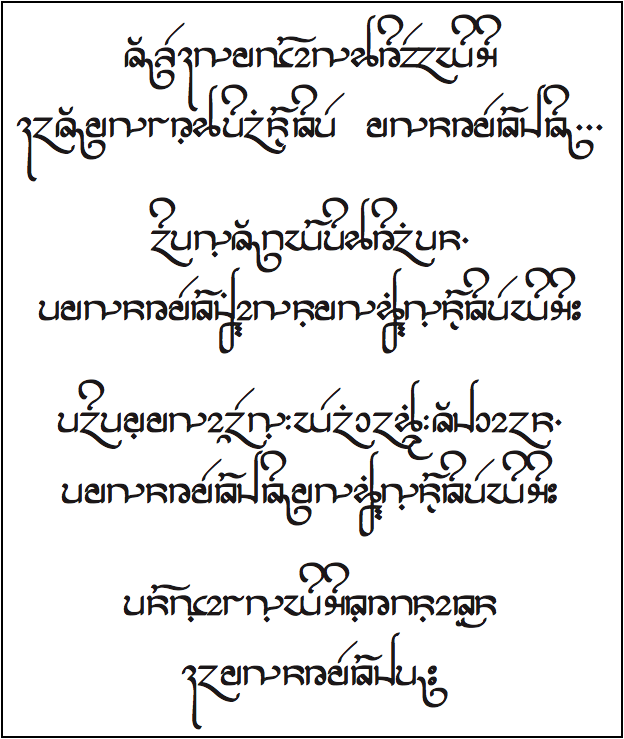|
|
| Translated by: |
Carsten Becker |
| Torch: |
Ang bengay malingya karonena hogo,
Nay ang manga varkayon sintoye, mangasara metidatong...
Noyang ang pahiyo karon yas,
Ya mangasara metidongyas manga kong sintoye hogo.
Yanoyam manganyeang-hen nā ku-adanyās,
Ya mangasara metidatong manga kong sintoye hogo.
Ya silvyang hogo trapas tyaisa,
Nay mangasara metidayang. |
| Smooth translation: |
I stand at the wild sea shore,
And the waves are crashing, they float away...
I want that the sea takes me away,
I would be swept away into the wild waves.
Because all my dreams are like that,
They float away into the wild waves.
I look fiercely at the beloved boat,
And float away. |
| Translation of previous torch |
Missing |
| Interlinear |
Ang bengay malingya karonena hogo,
ang beng -ay -Ø maling-ya karon-ena hogo,
AGTFOC stand-1sg.FOC shore -LOC sea -GEN wild,
I stand at the wild sea shore,
Nay ang manga varkayon sintoye, mangasara metidatong...
nay ang manga varka-yon sinto-ye-Ø, mangasara metida-tong...
and AGTFOC CONT crash-3pl wave -PL-FOC, away flow -3pl.AGT...
And the waves are crashing, they flow away...
Noyang ang pahiyo karon yas,
No -yang ang pah -iyo karon-Ø yas,
want-1sg.AGT AGTFOC take_away-3sg:n sea -FOC 1sg.PAT,
I want that the sea takes me away,
Ya mangasara metidongyas manga kong sintoye hogo.
Ya mangasara metida-ong -yas manga kong sinto-ye-Ø hogo.
LOCFOC away flow -COND-1sg.PAT MOT in wave -PL-FOC wild.
I would be swept away into the wild waves.
Yanoyam manganyeang-hen nā ku-adanyās,
yanoyam mangan-ye-ang=hen nā ku= adanya-as,
because dream -PL-AGT=all 1sg.GEN like=that -PAT,
Because all my dreams are like that,
Ya mangasaha metidatong manga kong sintoye hogo.
ya mangasaha metida-tong manga kong sinto-ye-Ø hogo.
LOCFOC away flow -3pl:n MOT in wave -PL-FOC wild.
They flow away into the wild waves.
Ya silvyang hogo trapas tyaisa,
ya silv-yang hogo trapas-Ø tyaisa,
LOCFOC see -1s.AGT wild boat -FOC beloved,
I look fiercely at the beloved boat,
Nay mangasaha metidayang.
nay mangasaha metida-yang
And away flow -1sg.AGT.
And I flow away. |
| Glossary/mini dictionary |
* adanya (pron) — that, that one
* beng- (v) — to stand
* -hen (adv) — all, every
* hogo (adj) — wild, fierce
* karon (n, ani.) — water; ocean, sea
* kong (prep) — in, inside of
* ku- (adv) — like
* maling (n, inani.) — shore
* mangan (n, ani.) — feeling, sentiment; dream
* mangasara (adv) — away (from the speaker)
* metida- (v) — to flow (here also: to float, to drift)
* nay (conj) — and
* nā (pron) — my
* no- (v) — to want
* pah- (v) — to take away
* silv- (v) — to see; to look at (+LOC); to watch (+BEN)
* sinto (n, ani.) — wave
* trapas (n, inani.) — boat
* tyaisa (adj) — beloved (< tya-, 'to love')
* varka- (v) — to crash
* yas (pron) — me
* yanoyam (conj) — because
Suffixes
Nouns
* -ya — locative
* -(e)na — genitive
* -ye — plural
* -ang — agent
* -as — patient
Verbs
* -ay — 1st person singular
* -(i)yo — 3rd person singular
* -(i)yon — 3rd person plural
* -ong — conditional mood
* -tong — 3rd person plural agent
* -yang — 1st person singular agent
* -yas — 1st person singular patient |
| Grammar notes |
Ayeri is an a priori language. The order of its sentence constituents may be
free, since all noun phrases are marked for case, however in actual use VAP
(VSO) is the preferred order. Modifiers usually follow their heads, at least
that is the case for adjectives, adverbs, possessive pronouns and relative
clauses. Adverbs of degree and measure are usually appended to the end of the
verb compound, indicated by a hyphen. Nouns have two main genders, animate and
inanimate; the animate gender furthermore differs between masculine, feminine
and neuter; sex equals gender. Animate things — as opposed to persons —are
neuter accordingly. What is important to know is that Ayeri's nouns and verbs
show something simlilar to "Austronesian Alignment" as Wikipedia calls it. In
the case of Ayeri, the case marker of the topicalized noun phrase is drawn
before the verb — thus acting as an anaphora —, the noun phrase in question
itself is left unmarked, which is also why there are case-marked and
non-casemarked personal pronouns series. Verbs use the encliticized unmarked
personal pronouns as an agreement with the agent of the phrase as well. When the
core of the agent noun phrase consists simply of a case-marked or focussed
pronoun, this pronoun is attached to the verb as well. focussing is usually not
applied to intransitive phrases. A simple way to make a passive is to use a
patient form instead of the agent form. Verbs — especially intransitive ones —
may thus take the patient as a subject as well. Note that the word "manga"
indicates motion in connection to prepositions and the progressive aspect when
used with verbs — in both cases it modifies the following phrase. Adjectives do
not show agreement with their heads. It should also be noted that two same
vowels in a row form a long vowel indicated by a macron, although there are
words with a lexicalized long vowel (due to compounding or contraction) as well.
|
| Native orthopgraphy |
 |
| Recording |
audio/mpeg |
